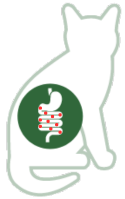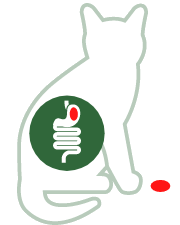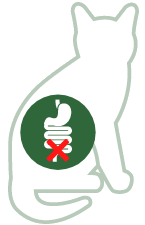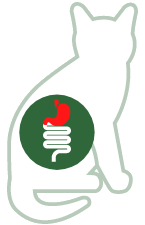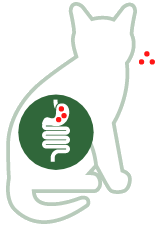Stomach and intestinal problems cat
One of the most common reasons for a vet visit is stomach and intestinal problems in cats. Diarrhea and vomiting are the main complaints, but a reduced appetite or difficulty with defecation, or constipation, are also frequently seen.
Fortunately, there's a lot you can do to help prevent and solve stomach and intestinal problems in your cat! Pharmacy4pets is happy to assist with products that support your cat's stomach and intestines.
From Head to Tail
Your cat's gastrointestinal system literally runs from her head to her tail. Digestion begins with properly chewing food and mixing it with saliva. Therefore, taking care of your cat's good teeth is the start of ensuring good digestion. Through the esophagus, the food enters the stomach. Here, the food is mixed with hydrochloric acid and enzymes which, along with the kneading movements of the stomach, break down the food mass. Then, the now more liquid mass moves to the small intestine. In the small intestine, enzymes from the pancreas and bile from the liver break the mass into even smaller pieces. Subsequently, the nutrients from the food mass are absorbed by the cells of the small intestine. Too large and indigestible parts move on to the large intestine. Here, bacteria, also known as the microbiome or gut flora, further break it down. The remains are excreted as stool through the rectum.
Symptoms of Stomach and Intestinal Problems in Cats
If your cat has stomach or intestinal issues, you may notice several things:
- Diarrhea: too thin stool, more frequent bowel movements than normal, blood or mucus in the stool, or an abnormal color or smell, all fall under the medical term 'diarrhea'.
- Vomiting.
- Reduced appetite.
- Flatulence.
- Clearly audible intestinal sounds.
- Weight loss (with or without good appetite).
- Constipation: difficulty defecating or not being able to defecate at all.
- Drooling.
- Feeling unwell or lethargic.
Causes of Stomach and Intestinal Problems in Cats
There are many possible causes for intestinal problems in cats. If your cat is suffering from stomach or intestinal issues, the cause can be both within and outside the gastrointestinal system. Some common causes of stomach and intestinal problems in cats include:
- Eating or drinking something inappropriate.
- A virus (such as coronavirus or parvovirus), bacteria (such as salmonella from raw meat or raw eggs), or parasites (common ones include Giardia and Tritrichomonas).
- Inflammation of the intestine, liver, or pancreas: a combination of inflammations in these organs is common and is called 'triaditis' or 'three inflammations'.
- Food hypersensitivity.
- Causes outside the gastrointestinal system: an overactive thyroid gland often causes diarrhea, leading to weight loss in your cat. Cats with chronic kidney disease often eat poorly and vomit.
- Medication such as antibiotics or anti-inflammatories.
- Hairballs.
- Megacolon: a dilation of the last part of the large intestine which makes it difficult for the cat to pass stool.
What Helps My Cat with Stomach or Intestinal Problems?
When your cat is suffering from stomach or intestinal issues, and also to prevent these as much as possible, there are several important things to consider:
- Good, easily digestible food: you can offer your cat its regular food more frequently in small portions throughout the day or opt for a dietary food that provides extra support for your cat's stomach and intestines. Specific conditions may require special dietary food such as a hypoallergenic diet or a kidney diet.
- Extra fiber: The psyllium fibers in Iso-Gel help optimize the consistency of the stool in both diarrhea and constipation.
- Probiotics: providing the bacteria in the gut with extra nutrients and good bacteria supports the gut flora optimally. Supporting the microbiome is particularly useful in cases of diarrhea and after a course of antibiotics.
- Deworming.
- Supplements that help firm up the stool such as Iso-Gel, Diarstop Pasta, and Diarsanyl Plus.
- Anti-hairball paste like Kat-a-lax or Lax-A-Past.
- Specific treatment: depending on the cause and severity of the stomach and intestinal problems, your veterinarian can treat your cat with anti-inflammatories, medication for nausea and vomiting, appetite stimulants, antibiotics, medication for an overactive thyroid, etc.
When Is It Wise to Go to the Vet?
If your cat vomits multiple times, diarrhea persists for more than three to five days, there is blood in the vomit or stool, your cat is not eating or drinking well or at all, clearly feels unwell, is losing weight, or is unable to defecate, it is very important that you go to the veterinarian. Cats handle not eating very poorly and fasting for just a few days can lead to fatty liver disease, which can make them even sicker. Kittens or older cats with gastrointestinal problems weaken faster, so do not wait too long to visit the vet.
If your cat is suffering from stomach or intestinal problems, it can be very distressing for her. Fortunately, these issues often resolve on their own and you can do a lot to support her digestive system. If you have any questions about our products or about stomach and intestinal problems in your cat, please contact us.


